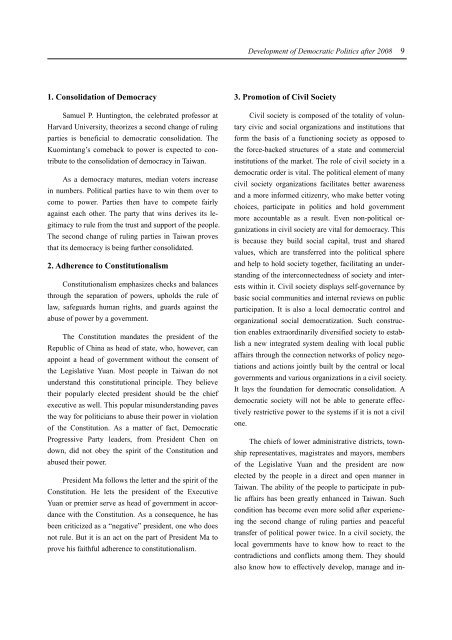PDF(2.7mb) - 國家政策研究基金會
PDF(2.7mb) - 國家政策研究基金會
PDF(2.7mb) - 國家政策研究基金會
Create successful ePaper yourself
Turn your PDF publications into a flip-book with our unique Google optimized e-Paper software.
Development of Democratic Politics after 2008 9<br />
1. Consolidation of Democracy<br />
Samuel P. Huntington, the celebrated professor at<br />
Harvard University, theorizes a second change of ruling<br />
parties is beneficial to democratic consolidation. The<br />
Kuomintang’s comeback to power is expected to contribute<br />
to the consolidation of democracy in Taiwan.<br />
As a democracy matures, median voters increase<br />
in numbers. Political parties have to win them over to<br />
come to power. Parties then have to compete fairly<br />
against each other. The party that wins derives its legitimacy<br />
to rule from the trust and support of the people.<br />
The second change of ruling parties in Taiwan proves<br />
that its democracy is being further consolidated.<br />
2. Adherence to Constitutionalism<br />
Constitutionalism emphasizes checks and balances<br />
through the separation of powers, upholds the rule of<br />
law, safeguards human rights, and guards against the<br />
abuse of power by a government.<br />
The Constitution mandates the president of the<br />
Republic of China as head of state, who, however, can<br />
appoint a head of government without the consent of<br />
the Legislative Yuan. Most people in Taiwan do not<br />
understand this constitutional principle. They believe<br />
their popularly elected president should be the chief<br />
executive as well. This popular misunderstanding paves<br />
the way for politicians to abuse their power in violation<br />
of the Constitution. As a matter of fact, Democratic<br />
Progressive Party leaders, from President Chen on<br />
down, did not obey the spirit of the Constitution and<br />
abused their power.<br />
President Ma follows the letter and the spirit of the<br />
Constitution. He lets the president of the Executive<br />
Yuan or premier serve as head of government in accordance<br />
with the Constitution. As a consequence, he has<br />
been criticized as a “negative” president, one who does<br />
not rule. But it is an act on the part of President Ma to<br />
prove his faithful adherence to constitutionalism.<br />
3. Promotion of Civil Society<br />
Civil society is composed of the totality of voluntary<br />
civic and social organizations and institutions that<br />
form the basis of a functioning society as opposed to<br />
the force-backed structures of a state and commercial<br />
institutions of the market. The role of civil society in a<br />
democratic order is vital. The political element of many<br />
civil society organizations facilitates better awareness<br />
and a more informed citizenry, who make better voting<br />
choices, participate in politics and hold government<br />
more accountable as a result. Even non-political organizations<br />
in civil society are vital for democracy. This<br />
is because they build social capital, trust and shared<br />
values, which are transferred into the political sphere<br />
and help to hold society together, facilitating an understanding<br />
of the interconnectedness of society and interests<br />
within it. Civil society displays self-governance by<br />
basic social communities and internal reviews on public<br />
participation. It is also a local democratic control and<br />
organizational social democratization. Such construction<br />
enables extraordinarily diversified society to establish<br />
a new integrated system dealing with local public<br />
affairs through the connection networks of policy negotiations<br />
and actions jointly built by the central or local<br />
governments and various organizations in a civil society.<br />
It lays the foundation for democratic consolidation. A<br />
democratic society will not be able to generate effectively<br />
restrictive power to the systems if it is not a civil<br />
one.<br />
The chiefs of lower administrative districts, township<br />
representatives, magistrates and mayors, members<br />
of the Legislative Yuan and the president are now<br />
elected by the people in a direct and open manner in<br />
Taiwan. The ability of the people to participate in public<br />
affairs has been greatly enhanced in Taiwan. Such<br />
condition has become even more solid after experiencing<br />
the second change of ruling parties and peaceful<br />
transfer of political power twice. In a civil society, the<br />
local governments have to know how to react to the<br />
contradictions and conflicts among them. They should<br />
also know how to effectively develop, manage and in-

















